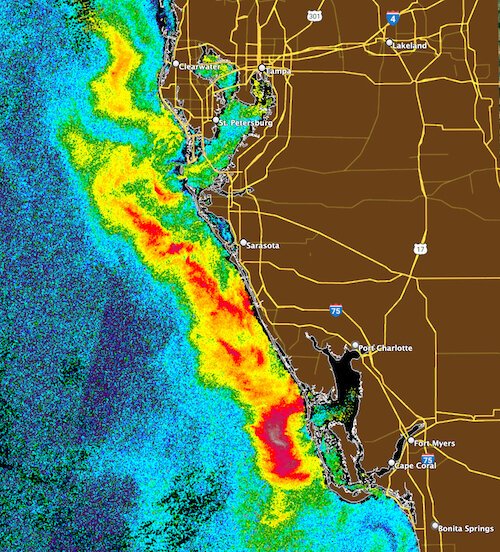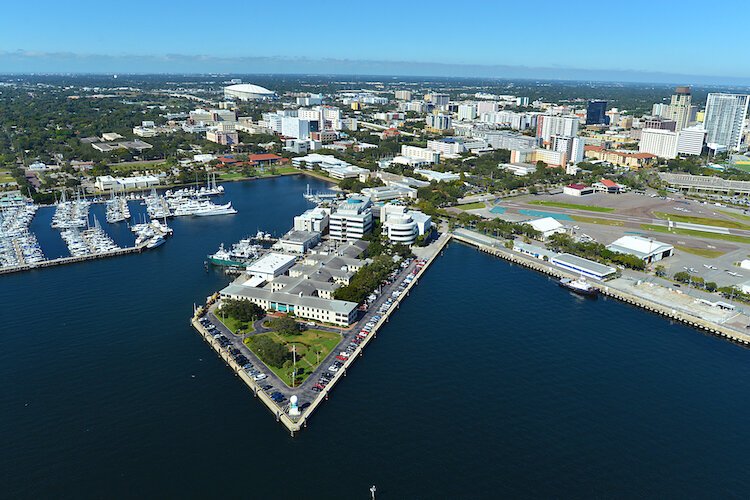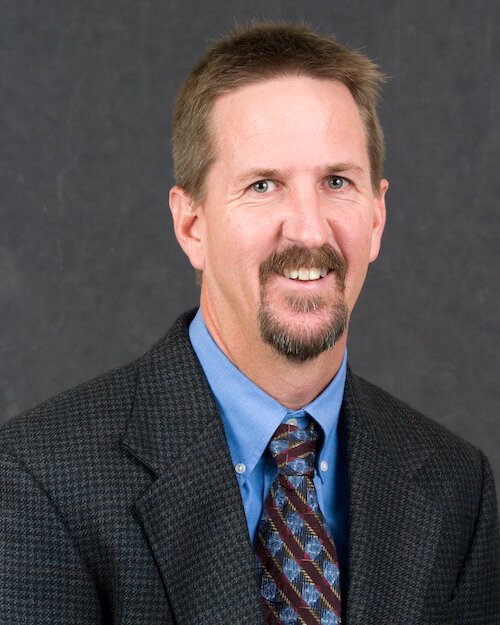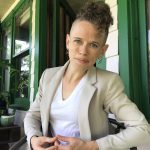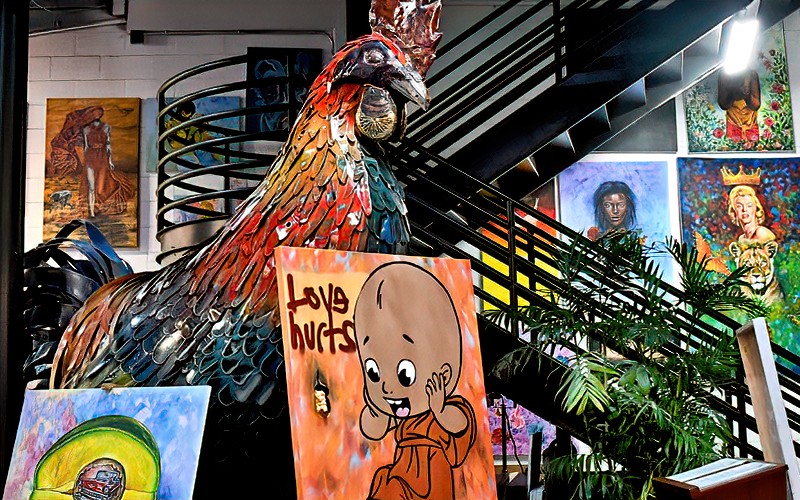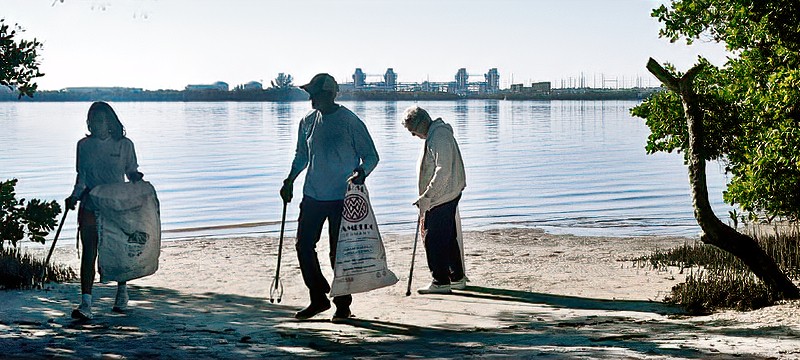Making St. Petersburg a Flood Hub for sea level rise, resiliency
With climate change and sea level rise likely to shape the future of Florida, a USF Center of Excellence in Environmental and Oceanographic Sciences and a Flood Hub coalesce at USFSP's College of Marine Science.
A rising swell of support from the Florida legislature, Board of Governors, and public and private partners in St. Petersburg indicates that the University of South Florida is poised to make bold strides in addressing climate change, sea level rise, and other environmental challenges Floridians face at present and into the future.
USF announced plans this month to create an interdisciplinary Center of Excellence in Environmental and Oceanographic Sciences, cornerstoned by the College of Marine Science (CMS) in St. Petersburg. The Center for Excellence aligns with the university’s ongoing efforts to consolidate its three campuses in Tampa, St. Petersburg, and Sarasota-Manatee by fostering collaboration among various colleges and research disciplines to address climate concerns.
In addition to acting as a focal point for USF’s Center of Excellence in Environmental and Oceanographic research, the College of Marine Science will also serve as home base for the Florida Flood Hub for Applied Research and Innovation, established in 2021 by the Resilience Act.
The Flood Hub is launching its first phase of operations at the Maritime and Defense Technology Hub in St. Pete’s Innovation District. Pending budget appropriations to be finalized this Spring by the Florida Legislature, USF intends to replace the current College of Marine Science with a state-of-the-art Environmental and Oceanographic Sciences Research and Teaching Facility, which would become the permanent home for the Flood Hub and other Center of Excellence research at USF St. Petersburg.
An ‘all hands on deck’ approach to combat climate challenges
Developing a Center for Excellence opens the floodgates for creative problem-solving potential by teaming up seemingly disparate research disciplines at USF. This includes an in-progress collaboration between CMS and the College of Arts and Sciences to launch an Environmental Chemistry program, as well as a new “Blue-Green MBA” — a Master’s of Business Administration with a blue-green economy focus under development with the Muma College of Business.
College of Marine Science Dean Thomas K. Frazer is quick to point out that while the CMS will serve as a focal point for marine and environmental research, the Center of Excellence itself is not so much a central location but rather a broader concept — a “constellation,” as Frazer describes it, of programs working together both within and outside the university system to tackle big environmental issues that require multifaceted solutions.
“There’s a lot of expertise and intellectual capacity distributed across the university system. We want to step back and recognize where that expertise exists so we can bring it together in a way that’s going to create the most opportunity moving forward,” Frazer says.
“It’s a constellation of programs on the St. Petersburg campus — and not just in the university. Right across the walkway from us, for example, is the Florida Fish and Wildlife Research Institute. They’re tremendous collaborators and partners in the work we do. There are also federal entities within very close proximity. We’ve got the NOAA Fisheries Southeast Regional Office and the USGS regional offices here, as well as other key players. We have the Innovation District. They target a private sector, but strategically, in a way that creates opportunities for interaction among those entities as well as the university.”
Perhaps the brightest star anchoring this constellation is a proposed Environmental and Oceanographic Sciences Research and Teaching Facility building that would replace the current CMS — an approximately $80 million project to create a central instructional space for undergrad and graduate students from USF’s colleges of Marine Science, Arts and Sciences, and Engineering. USF College of the Arts is also a key player in Center of Excellence work around environmental and oceanographic problem-solving.
“Many people realize there’s also a thriving arts community here in St. Petersburg. We’ve got some really nice collaborations with the College of the Arts. Right now we’re pursuing a new position in data visualization which will be able to bridge the data-rich world that exists in the sciences with the more visual space that a lot of our stakeholders might relate better to,” Frazer notes.
USF seeks Public Education Capital Outlay (PECO) funds in order to begin construction on the project, which will start immediately if funds are appropriated, with the demolition of the northwest wing of the existing Marine Science Complex at 830 1st St. South in St. Petersburg. A new four-story addition is proposed to replace the demolished section, while the remainder of the 80 year-old building would undergo remodeling to create new research labs and classrooms.
Flood Hub places St. Pete on front lines in combating rising tides statewide
“One of the things that will be part of that building as we envision it is the Florida Flood Hub for Applied Research and Innovation. We’re fortunate, through the last legislative session, to be recognized as the entity that would house the Flood Hub,” Frazer says.
The Flood Hub for Applied Research and Innovation was proposed by House Speaker Chris Sprowls and signed into existence with Senate Bill 1954 last year. The Florida Department of Environmental Protection (FDEP) provides organizational support.
For now, Flood Hub is housed at the Maritime Defense and Technology Hub in the Innovation District. Beyond a tech-oriented core staff of data acquisition specialists, analysts, visualization experts and science liaisons skilled in communicating data-dense findings to state and local policymakers, Frazer says Flood Hub will rely heavily on outside collaboration.
“Given the importance of the problems that we’re dealing with, we’ve reached out beyond the state of Florida to include experts from other universities as well as experts in the federal system that can participate in science working groups. The first working group, for example, is in charge of acquiring sea level rise data and downscaling that information to make it more relevant to the folks in Florida. We’ll use that information and provide it back to the state so they can make more refined vulnerability assessments at the municipality level. I think that’s very important because not everywhere is created equal with regard to sea level rise,” Frazer explains.
“When you try to forecast where flooding is going to be most problematic, you need several components — not only with sea level rise. You need precipitation data, you need tide data, you need to be able to forecast and predict storm surge based on that tide data; you need information related to our stormwater systems, as well. Ultimately the goal is to create comprehensive models that will provide more granular forecasts so that we can be better prepared in a flooding event. We can also think about how we’re going to adapt to projected changes moving forward,” he adds.
Positioning USF researchers as thought leaders, change-makers for resilience
“There is not a better location, in my opinion, for the Flood Hub,” Frazer says.
“The College of Marine Science on the St. Petersburg campus is ground zero for a large number of environmental challenges, especially those related to sea level rise and other coastal hazards. We are in a position to coordinate and carry out the science needed to provide improved sea level rise projections, better storm surge models and other information that will inform vulnerability assessments and risk analyses locally and around the state. Improved forecasting and the ability to predict flooding events with increased certainty will be key moving forward important conversations about how to build resilient coastal communities.”
He notes that Flood Hub’s risk and vulnerability assessments focus on identifying critical assets such as transportation, infrastructure, schools, hospitals, emergency management facilities and wastewater treatment facilities — and then putting them in an economic context to help state and local policymakers to prioritize investments moving forward.
“Why do you do it here? Because we have a well-established science presence already. We know we’re going to have to modify the way that we create and occupy space in our college, on our campus and other vulnerable areas along the coast. We can make adjustments and modify the way we carry out our business — and we need to do it in a way that allows other people to learn from what we do so we can continue to do all the things our contemporary society does. We want a vibrant business community; we want to continue to have people who are interested in enjoying what the coastal environment has to offer,” Frazer says.
The full cost of the Environmental and Oceanographic Sciences Research and Teaching Facility proposed to eventually house the Flood Hub is $80.3 million. Of that total, $60.3 million would be provided by the state and $20 million from University of South Florida, per Florida Board of Governors recommendations. If fully funded, the facility is expected to generate millions in economic impact annually.
“The opportunity here for all of this work is that we can certainly identify challenges and learn how to address them. If we can do that successfully in a large metropolitan area like the Tampa Bay region — and if we can do it in a way that allows us to continue to be economically vibrant and resilient — then we’ll be a role model for other locations, not only in Florida but around the world. It’s about how you recognize problems, how you respond to those challenges, and how you adapt using science and technology to carry on,” Frazer says.



